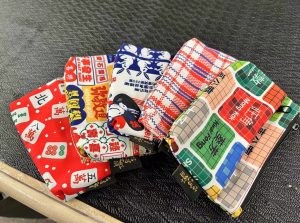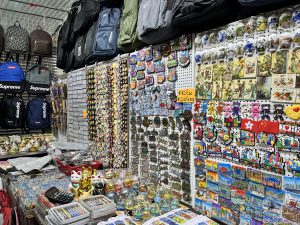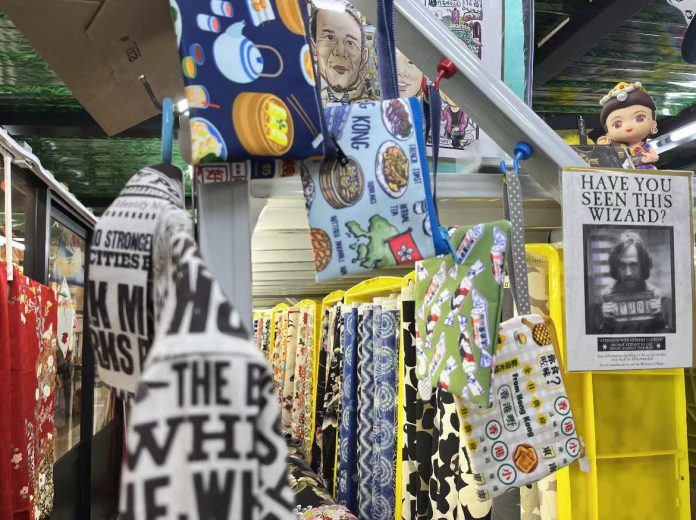Tourists do not find old fashioned Hong Kong souvenirs in Temple Street appealing.
By Alexia Leung
Taking advantage of his own textile business, Keith Mok is making Hong Kong souvenirs such as coin bags, backpacks and shopping bags patterned with minibus signs, MTR station names and neon sign boards which are displayed at his shop in Sham Shui Po Fabric Market.
“We are still developing new products that highlight unique features of Hong Kong. We are going to produce crossbody bags and drawstring bags using fabrics with mahjong and minibus signs patterns to make it look more stylish,” the 26-year-old shop owner says.
“Both Hongkongers and tourists (buy these products)… Half of the tourists are from Europe, US and Australia. The other half are from Malaysia, Taiwan and Singapore,” he adds.
Coin bags are sold for HK $50 (US $6.39) each and the shopping bags are sold for HK $180 (US $23.02) each.

“Our products are a bit more expensive than others because the products are made in Hong Kong by Hong Kong tailors, the sewing process is complicated and the fabrics are imported from Japan,” Mok says.
In an attempt to expand his business to reach out to more tourists, Mok is putting up pop-up stores in D2 Place and the Mills. “We will have a spot in the Central Market soon,” he adds.
While Mok is developing new Hong Kong souvenirs, vendors at Temple Street, a popular tourist spot, are still selling products designed decades ago.
Souvenirs such as stuffed pandas, dim sum magnets and Victoria Harbour keychains can be found in Temple Street. Most of them are imported from mainland China. The price ranges from HK $20 (US $2.56) to HK $90 (US $11.51).
Jonathan Schāfer*, a German tourist who came to Hong Kong for the first time, finds the souvenirs in Temple Street are more of a Chinese style than a Hong Kong style.
“The souvenirs here cannot really represent Hong Kong. I think it’s like basic tourism stuff you get all over the world… Some are special compared to other countries like the chopsticks, but it is so basic. It is the typical Asian, Chinese style in the eyes of a Westerner,” the 18-year-old tourist says.
Another German visitor, Manuel Schmidt*, traveled to other Asian countries with his wife before coming to Hong Kong.
“The quality of the souvenirs here is the same as the other countries we were in before, like in Vietnam and Thailand. I think it’s because everything is from China so it is the same quality,”
Thomas Parker, a tourist from England, came to Temple Street only for sightseeing.
“I don’t want to spend a lot on souvenirs here. I’m just looking around… exploring… I like the atmosphere here. Everything looks the same, so I can’t tell much about the quality,” he says.

Tourists are not the only ones struggling to find special souvenirs. Hongkonger Matthew Chung* is having a hard time finding souvenirs for his Taiwanese friend.
“The souvenirs… the stuffed toys… you wouldn’t know that it is from Hong Kong. There’s not many Hong Kong features. You wouldn’t buy souvenirs here for friends, especially for foreign friends, there is nothing special,” the 60-year-old man says.
Chan Kam-wing, Chairman of the Yau Ma Tei Temple Street Association of Hawkers and Shop Operators, says they hope to collaborate with hawkers who sell dry goods to sell some packaged food such as fish maws, dry scallop, salted fish, walnut cookies and century egg puffs as Hong Kong souvenirs.
“The dry goods at Temple Street can also be souvenirs. For example, ‘I Love HK’ T-shirts, Hong Kong landmark keychains, cartoon keychains and Hong Kong luggage tags. These are things that have Hong Kong features and can be sold as souvenirs,” he adds.
Chan aims to turn Temple Street into a souvenir street by first persuading the hawkers to introduce new souvenirs, and local brands such as Kee Wah Bakery and Bee Cheng Hiang can also set up stores at Temple Street.
In response to Varsity’s enquiry, the Hong Kong Tourism Board (HKTB) says that they will continue to develop more special tourism products and introduce new experiences for tourists.
“Promoting tourism through mega events and reinforcing Hong Kong’s position as the Events Capital of Asia…Developing more special tourism products and experiences in collaboration with the travel trade focusing on potential markets and visitor segments, to attract visitors from different source markets to come to Hong Kong,” the board says in an email.
*Names changed at interviewees’ request
Sub-edited by Liam Hordijk







































